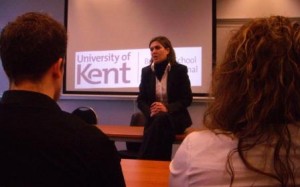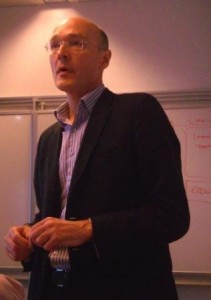Bringing together a large number of students, experts and practitioners, the BSIS Development Forum, with the support of professor Dr. Tugba Basaran, hosted a conference on microfinance entitled ‘The Future of Microfinance: Overcoming New Barriers’ on February 26. The conference, organised by Forum members Jessica Schmit (MA, International Development) and Miguel Gomes (MA, International Political Economy), provided students with both a background in theories of microfinance and an understanding of current issues.
The day started with an introductory lecture by Dr. Basaran and David Kruijff, a microfinance consultant, intended to give an overview of microfinance to those who had no background in the topic. The lecture covered the history and rationale behind the practice of microfinance, particularly within the context of lifting people in the developing world out of poverty, and some of the successes and pitfalls that have occurred in the practice of microfinance. Basaran and Kruijff noted that microfinance ensures access to savings, credit and insurance for all people, in particular those with low income who would normally be excluded. It typically bypasses the need for formal collateral, the greatest hurdle for the poor to access the mainstream banking system. They further noted that although the industry has seen a tremendous growth over the past decade, rough estimates show an unmet demand for financial services of over 70 percent.
Following the lecture was a panel discussion that included four leading microfinance experts, with Kruijff serving as the moderator. Ludovic Urgehe, a teaching assistant at the Warocqué Faculty of Economics and Business and PhD candidate and research fellow at the Centre for European Research in Microfinance in Belgium, spoke about the influence of microfinance investment vehicles and the emerging specializations within this field. André Laude, the chief financial officer for the International Finance Corporation’s Global Financial Markets Department, discussed the role of capital markets in microfinance. Laude also discussed the impact of the financial crisis on microfinance.
Duncan Goldie-Scott, a pioneer of mobile money in the context of microfinance, gave a detailed overview of the history of mobile payments. He discussed how these have been revolutionary in Africa and will continue to be revolutionary within microfinance in the next five years. Goldie-Scott currently serves as the director of Musoni Mobile Microfinance BV in East Africa. Finally, Loïc De Cannière spoke about the importance of reaching the rural poor and the numerous existing opportunities in rural microfinance. He pointed out that microfinance traditionally under serves this sector despite these opportunities. Cannière is the managing director of Incofin Investment Management, a company specializing in rural microfinance and one of the largest microfinance equity investors worldwide.
The conference audience was comprised of a diverse group of students from BSIS and other Brussels universities, as well as practitioners from the microfinance and banking sectors, who peppered the speakers with insightful questions and ensured a lively discussion. Attending students, such as Emily Gloeker (MA, International Development) praised the opportunity to meet and mingle with practitioners: ‘The conference was extremely interesting and an opportunity to learn a lot about a field most people only know a little about’, she said.



